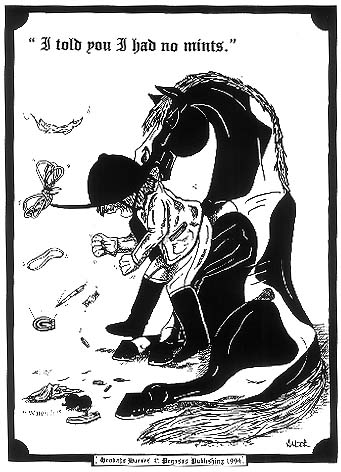Handsome and Cheap
 Julie is forty and has been riding for years. She has already owned three horses in succession, and is shopping for her fourth. She has ridden a lot and mainly enjoys trail riding. She has tried a bit of everything and touched on several riding styles, but never very long. She has never shown and has no interest in competing. She has taken riding lessons, mainly when she started to learn to sit on a horse, and then only occasionally, usually to fix specific problems. She is passionate about horses, reads a lot and travels to all kinds of horse events as a spectator. It really is a hobby for her, an activity to relax and to unwind from work and daily life.
Julie is forty and has been riding for years. She has already owned three horses in succession, and is shopping for her fourth. She has ridden a lot and mainly enjoys trail riding. She has tried a bit of everything and touched on several riding styles, but never very long. She has never shown and has no interest in competing. She has taken riding lessons, mainly when she started to learn to sit on a horse, and then only occasionally, usually to fix specific problems. She is passionate about horses, reads a lot and travels to all kinds of horse events as a spectator. It really is a hobby for her, an activity to relax and to unwind from work and daily life.
Her budget for a horse is limited, but she is ready to look for a long time to find a horse that she will like. She wants a young horse, to be able to shape him from the start. She also hopes to reduce the likelihood of having to deal with the health problems that her older horses suffered.
Finally, she buys a handsome colt of lovely color, two and half years old, just backed and very flashy. He is cheap, the owner is an amateur who raised him in his backyard, and is eager to sell. The horse has no known lineage.
Quiet during the initial visit and his first week at the barn, Julie finds Pegasus lacks muscle and needs to put on weight. She starts putting him to work and increases his feed to fatten him up. Her first attempts at lunging already show that Pegasus is disrespectful and that he does not easily get to work. In the barn, he is very mouthy, bites occasionally and quickly becomes agitated. He won’t stand in the aisle, grabs everything in reach in his mouth and is not easily manipulated. Still, Julie feels ready to take on his training.
During the next two years, Julie spends many hours at the barn trying to educate her young horse. She gets some results, but it is demanding, takes a lot of time, work and energy. The first months under saddle are very difficult, Pegasus does not respond well, does not turn, runs off, throws himself against the fence and other horses. He has a lot of energy, is very quick, very smart and has an unending supply of defensive tricks. He becomes easily aggressive when frustrated. His reactions are so quick that Julie is often taken by surprise and has no chance to correct in time.
She decides to have Pegasus trained by a professional rider for a few months. The trainer demonstrates progress with the horse, but when Julie rides, she still has a hard time getting respect. She has to work a long time to get an acceptable ride and to obtain the horse’s cooperation. She is never able to get the same results as the trainer. At the barn, Pegasus’ behavior degrades. He bites often, charges at times, misbehaves on line and is not liked by the barn staff who have to handle him. He is moved to a different stall to avoid injuries to visitors. Julie, who likes to travel, has a difficult time finding people to care for him while she is away, because he is hard to handle and not always safe.
What happened? Julie was essentially impressed by Pegasus’ looks and color, matched to a suitable price tag. She had set specific criteria for her choice, but unfortunately did not have the tools nor the savvy to evaluate the character of the horse that she bought. The short initial visit did not allow her to highlight any of the behavior issues that she discovered later. In addition, Pegasus, under-fed and under-exercised prior to purchase, did not have his normal energy level when she got him. Fed and fit, his true nature returned! Another mistake: this type of horse does not do well cooped up in a stall, and might be calmer if kept outdoors with other horses, especially older mares that would teach him some manners! Julie preferred to board him in a facility close to where she lived which could not offer this type of service, in order to minimize travel time after her day at work.
Today, Julie is still working with her horse, but her hobby is a lot more like an obligation and she often returns from the barn frustrated and tense. She would like to sell her horse in a year or so, but Pegasus is not making a lot of progress and he has earned a poor reputation in the barns that hosted him, that could make him difficult to sell. Julie spends a lot of her time at the stable ‘tiring’ him, trying to get him to calm down, and attempting to earn some respect. She has little time left to go out on the trail and does not have all the fun she expected from her partnership with her horse.
